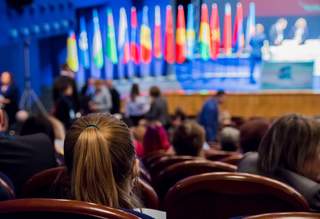
Ⓒ AdobeStock/lapandr
The G20: Leading Forum for Global Governance
Since the 1980s, the role of emerging economies in the global economy has grown continuously. In 1999, the Finance Ministers and Central Bank Governors of the G20 met for the first time to manage the financial crises in Asia, Latin America, and Asia. The crisis demonstrated that the G7 alone were not able to handle a crisis of such magnitude.
The G20 Leaders’ Summit
The U.S. subprime crisis, which in 2008 escalated into the biggest global financial and economic crisis in more than 80 years, reiterated the need for policy coordination among the G20 countries. Drawing on the lessons learnt from the Great Depression of the 1930s, the heads of states and governments of the G20 countries met in 2008 to coordinate their fiscal, monetary and trade policy. In the 1930s, competitive currency devaluation and rampant protectionism had led the crisis, which lasted for years, to spread around.
Policy coordination across the G20 states allowed for stabilisation of international financial markets, maintenance of global trade to the best extent possible, and the initiation of regulatory reform. The coordinated national bank bailouts and economic stimulus programs as well as the G20’s commitment to refrain from protectionist measures were among the most important steps in overcoming the crisis.
Sustainable and Inclusive Growth
The mandate of the G20 is laid down in the Framework for Strong, Balanced, and Sustainable Growth adopted at the 2009 Pittsburgh Summit. Accordingly, the G20 is to focus on the coordination of fiscal, financial, and monetary policy and the promotion of structural reforms, foreign trade, investment, and sustainable growth. The Pittsburgh Summit designated the G20 as the “central forum for international economic cooperation.”
However, the G20 agenda is increasingly becoming broader. In addition to the core economic and financial policy agenda, it now includes issues such as development, Internet governance, digitalization, energy, climate, health, and migration. The summit agendas are determined by the priorities of each G20 Presidency. For example, the German G20 Presidency founded the G20 Compact with Africa to foster economic growth and development in Africa.
The G20 has both the necessary weight and legitimacy to play a central role in global economic governance. Its members are not only responsible for 89 percent of global GDP and around 60 percent each of global merchandise exports and imports, but also account for a good two-thirds of the world’s population.
Operating Principles of the G20
The G20 is an informal forum rather than an organization and holds no permanent secretariat. Instead, the rotating presidency – in close coordination with the previous and following presidencies (Troika) – is responsible for the G20 agenda, as well as the organization of working processes, meetings, and events. All decisions need to be taken by consensus.
The informal character of the G20 is both the weakness and strength of the institution. As its decisions are not binding under international law, its success depends largely on the willingness of its members to implement the joint declarations. On the other hand, it offers the necessary flexibility to find compromises between its members.
Once every year, the heads of state and government come together at the G20 Summit to summarize their joint decisions in the G20 Declaration. In addition to the Summits, various meetings of G20 ministers and G20 working groups take place several times each year. The G20 also works closely with international institutions and civil society. The G20 Presidencies are flanked by extensive civil society engagement. In eight dialogue fora – Business20, Civil20, Labour20, Science20, Think20, Urban20, Women20 and Youth 20 – social actors from all G20 countries actively participate in the G20 process.
G20 Presidencies Struggle to Address Timely Challenges
In recent years, the G20 has been under more extensive pressure to find unity due to geopolitical challenges. The summit communiques and policy papers in the area of trade policy in Japan (2019) and Saudi Arabia (2020) fell short of the level of ambition that German industry would have wanted, with particular lack of a common stance against protectionism and concrete reform proposals for WTO reform. In both years, support for the Paris Agreement was only on a 19+1 basis due to opposition from the then-Trump administration. The Italian presidency (2021) was more ambitious, with highlights from their ministerial meetings including the support of finance ministers for a global minimum tax of 15 percent and for reallocation of profits of multilateral companies, and the extraordinary meeting on Afghanistan in which leaders reached consensus on the importance of humanitarian assistance and human rights in the country and pledged to play an advocacy role, also for women and girls.
However, the 2022 Presidency under Indonesia has delivered a substantial blow to multilateral cooperation within the G20. Against the backdrop of the Russian war of aggression, the Presidency self-evidently (given Russian membership in the G20 and Indian and Chinese ambivalent positions on the war) struggled with prioritization and delineated the difficulty of the G20 to actually find consensus on key geopolitical challenges. G20 documents (not joint statements) focused largely throughout the year on financial stability and infrastructure investment, nevertheless without mention of the key crisis that affects both areas substantially. There was also less coherence between task forces and cross-cutting priorities, with global health architecture one of the three “priority issues” but without an expert task force dedicated to the topic. India will take over the Presidency in 2023.



